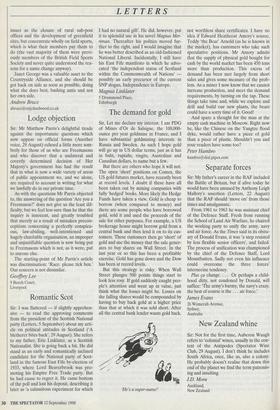The demand for gold
Sir, Let me declare my interest. I am PDG of Mines d'Or de Salsigne, the 100,000- ounce per year goldmine in France, and I have substantial goldmining interests in Russia and Sweden. As such I hope gold will go up in US dollar terms, just as it has in baht, rupiahs, ringits, Australian and Canadian dollars, to name but a few.
But there are others who hope it will not. The open 'short' positions on Comex, the US gold futures market, have recently been at record levels. I doubt if these have all been taken out by mining companies with fully 'hedged' books. More likely the Hedge Funds have taken a view. Gold is cheap to borrow (when compared to money) and there are some people who have borrowed gold, sold it and used the proceeds of the sale for other purposes. For example, a US brokerage house might borrow gold from a central bank and then lend it on to its cus- tomers. These customers then go 'short' of gold and use the money that the sale gener- ates to buy shares on Wall Street. In the last year or so this has been a profitable exercise. Gold has gone down and the Dow has been at record levels.
But this strategy is risky. When Wall Street plunges 500 points things start to look less rosy. If gold suddenly caught peo- ple's attention and went up in value, just think what the losses might be. Losses on the falling shares would be compounded by having to buy back gold at a higher price than that at which it was sold short. After all the central bank lender wants gold back, `He's a super-nurse!' not worthless share certificates. I have no idea if Edward Heathcoat Amory's source, Teddy 'the Bear' Arnold (as he is known in the market), has customers who take such speculative positions. Mr Amory admits that the supply of physical gold bought for cash by the world market has been 450 tons more than production. This excess of demand has been met largely from short sales and gives some measure of the prob- lem. As a miner I now know that we cannot increase production, and meet the demand requirements, by turning on the tap. These things take time and, while we explore and drill and build our new plants, the bears could have a sorry time of it. Good!
And spare a thought for the man at the empty cash machine in Moscow. Right now he, like the Chinese on the Yangtze flood dyke, would rather have a piece of gold than a piece of plastic. Shouldn't you and your readers have some too?
Peter Hambro
hambro@dial.pipex.com


































































 Previous page
Previous page